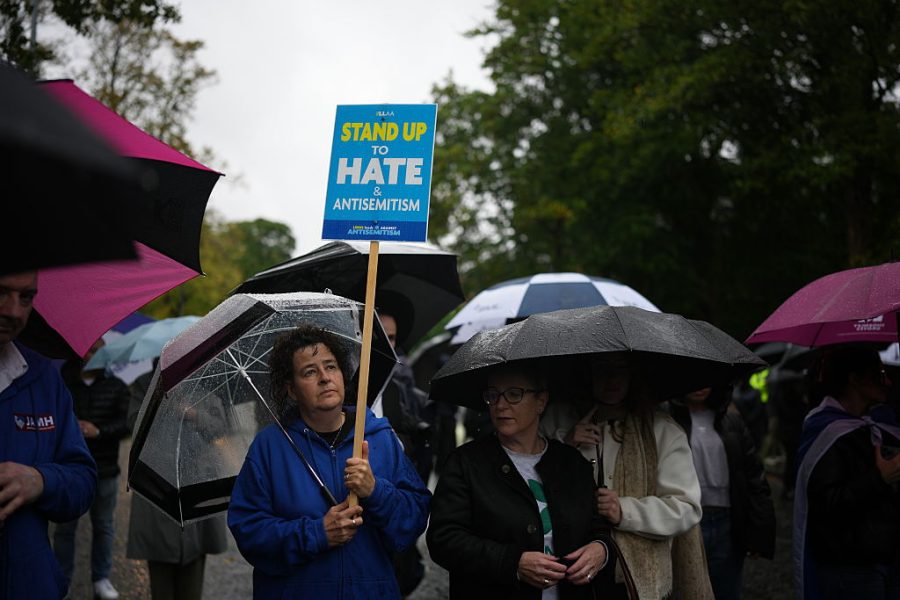Like thousands of Jewish people, I was in synagogue on Thursday when the news came. My community and I were celebrating Yom Kippur – the most sacred day of the Jewish calendar when even non-practising Jews attend services. Suddenly dozens of mobile phones began to erupt with messages and a stream of murmurs echoed round the congregation: a synagogue had been attacked in Manchester.
This was the nightmare scenario that had been at the back of our minds for many years, now coming true via reports of a seven-minute car and stabbing rampage. Yes, we were shocked and appalled – but not surprised.
Ever since Hamas terrorists attacked Israel on 7 October, 2023, anti-Semitism in Britain has been on the rise. Synagogues have been daubed; Jewish-owned businesses have been splattered with red paint; my people have been abused in the streets and physically attacked.
It was a level of anti-Semitism which – terrible as it is to say – we had grown used to. The only question was whether it would continue to simmer at that level or boil into something more murderous – as it did.
In church, Christians sign up for the flower or tea rota; in synagogues, Jews sign up for the security rota
Perhaps this explains the reaction of my congregants on Thursday – which was not to leave our synagogue in Oxford. Fearing a copycat attack, everyone stayed put. We wanted to show solidarity; to show that we were there, physically and emotionally, for one another. But there was also a keen sense that it could have been us – not just as a target community but as one of the individual victims who had been killed or injured while fighting off the attacker.
I myself am among a long list of synagogue members who take it in turns to be ‘on duty’ at the door in case anyone with hostile intent tries to force their way inside. The unpleasant reality is that having security volunteers has long been part of synagogue life: whenever you go, there is always someone on the door. Yes, they greet members or welcome guests with a friendly smile, but they also have instructions about what to do in case of trouble. In church, Christians sign up for the flower or tea rota; in synagogues, Jews sign up for the security rota. What a contrast. What a terrible indictment of religious life for Jews in Britain today.
Of course, since the Manchester attack, we have also been thinking of how to respond. Personally I am adamant that we should not surround our synagogues with barbed wire, which would be horribly dispiriting to members and deeply unpleasant for neighbours. Instead, we must remain open, both physically and in spirit. We must keep going with the full range of our activities and let Jewish life be as vibrant as before.
Many synagogues, for instance, hold weekly lunches for homeless people in the area; many let local charities use the same classrooms that host religion school on Sundays. If we were to curtail activities, withdraw from inter-faith relations and instinctively retreat into our comfort zone, that would be giving posthumous victory to the Manchester attacker (his name is now well-known, but I prefer not to utter it).
Yes, we will have heightened security. But we must try to regard what happened in Manchester as the exception rather than the rule, and focus on the everyday tolerance of British society at large. Given the ongoing situation in Gaza and suspicions over the attacker’s motive, it is worth specifying that this includes Jewish-Muslim relations. Among the many texts and emails I have received offering condolences and support have been ones from Muslim friends, as well as a leading imam. He and I know that it is not for nothing that we, along with Christians, are known as the three Abrahamic faiths. We share not just a common ancestor in the prophet Abraham, but common values. The traditional Jewish greeting of Shalom aleichem – peace be upon you – is replicated exactly in Islam with Salam aleikum, both in sound and meaning.
Following the 9/11 attacks, I went to my local mosque and said a prayer for peace in Hebrew; my friend the imam reciprocated, saying an Arabic prayer for peace in the synagogue. It did not change world events, but it sent a strong message to our respective communities: that what divides us is not nearly as important as what unites us. In Britain today, that message is more haunting and crucial than ever.







Comments